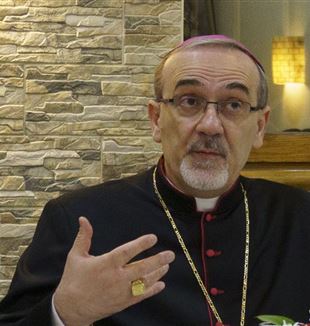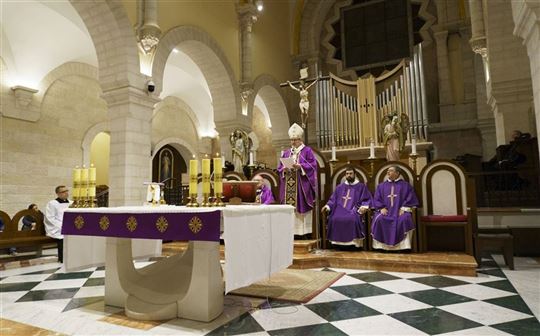
"His intuition: to bring Christ back to the center of human experience”
The homily of Monsignor Pierbattista Pizzaballa, Latin Patriarch of Jerusalem, during mass for the centenary of Fr. Giussani. Church of St. Catherine, Bethlehem, March 11.Dear brothers and sisters, may the Lord give you peace! This celebration of ours is among a number of Holy Masses celebrated throughout the world on the occasion of the 40th anniversary of the pontifical recognition of the Fraternity of Communion and Liberation, but it is also an opportunity to give thanks and at the same time reflect on the presence of your movement within our Church in Jerusalem.
February is the month of Fr. Giussani's ascent to heaven and this is the centennial year of his birth. As you can see, a series of events have come together in unity that joyfully oblige us to give thanks to God. He is the one who raised Fr. Giussani in his Church and gave him the living and original experience of faith, a method for living it, charity without boundaries, and a hope that knew how pass through even the most difficult events to find the light of Christ that can lead every person towards the future.
It is particularly significant to remember Fr. Giussani here in Bethlehem. If I were to ask members of the movement, especially those who lived alongside Fr. Giussani for either a short or long time, "what is the heart of this charism of yours?", they would answer, at least for the most part: "the Incarnation." It might seem trivial because the Incarnation is also the heart of the Christian faith, and therefore common to all. But Don Gius, as he liked to be called, had already understood that society was to go through epochal changes never seen before; it was to be hit by social and economic revolutions of enormous scope, where it seemed that the salvation of the world according to dominant thought depended exclusively on the work of man and not on religious theories that were thought to be separate from real life. It was necessary to find new ways to communicate faith in that society which was so different and in some ways even adverse. What was the core of our faith, the Incarnation, risked remaining only a definition, an article of faith, but not a lived life, an experience, an encounter. An increasingly evident gap was being created between faith and life, between the church and the world. Believing in the Incarnation, on the other hand, means seeing reality, the real world, through the eyes of someone who has been saved. It means believing and experiencing that this real world, such as it is, has been reached by Christ, the only and true salvation, and that I can still encounter salvation here and now, in this very world, and see Christ. As far as I know, this was precisely the providential intuition Don Gius had: to bring Christ back to the center of human experience, to incarnate Him in real life, to be able to see His face in this world of ours.
Nazareth and Bethlehem are therefore the center of Giussani's experience. That little girl in Nazareth and that child born in Bethlehem speak to us of a God who becomes Man, who comes to live among us, who takes on our nature, our face, our very habits, who also lives our fragility. He does not want to hide Himself, but He has nevertheless inserted Himself in every fold of human history so that we can seek Him in every place and situation, recognize Him, and love Him.
It is not by chance that Fr. Giussani spoke of his pilgrimage to the Holy Land as a fundamental event in his life. At the same time, he was certain of living following the footsteps of Christ every day, of listening to His voice every day, of longing for His face every day. We can truly say that every place was the Holy Land for him. This is a lesson for us too, who could live here getting used to familiarity with Christ or ignoring it, or even neglecting it.
From a certain point of view the Holy Land – Jerusalem, Nazareth, Bethlehem – are the heart of the movement: everything was born here, everything can be reborn here every day. The small community of CL in the Holy Land therefore has a responsibility towards the entire movement. The Church of Jerusalem has the mission to remember the Incarnation of the Holy One every day, and to remind the universal Church that that Event, the Incarnation, is necessarily linked to this Land. Hic Verbum Caro factum est. Thus the movement of CL in the Holy Land has the same function: to be that unique and special link between the movement in the world and the Land of the Holy. In a certain sense, you are the custodians of the charism of CL in the world.
Even here in the Holy Land, however, we need to make visible the intuition of Don Gius, who was able to admirably synthesise life and faith, and at the same time was able to transmit it to thousands of people around the world, for several generations. Here too we need – yes we, custodians of the Incarnation – to experience that faith is life, that Christ truly is the answer to our truest desires, and that only through Him can we have a view of our society in the Holy Land that is truly liberating. We too, in fact, wounded by years of conflict, by enormous social inequalities, run the risk of seeking easy and immediate answers, which are always misleading, short- sighted. We, too, need someone to bring us back to a true and fulfilling gaze on our daily lives. And it is not catechisms or parish meetings or pastoral plans that will open our eyes. Only by encountering a redeemed person can one experience redemption. Only a person saved can bear witness to salvation. May you be for our Church those people who help us made that difficult but wonderful synthesis between faith received and life lived.
Read also - Dublin: "An invocative and creative charism"
A final consideration. Part of your charism was also to bring your experience back to the world of culture, to bring Christian thought into the university context and cultural world, where it is now sadly absent. Even in this world of ours in the Holy Land, where Islam and Judaism are the cultural majority, lively but also curious and open, a Christian presence is becoming increasingly urgent; a Christian presence that knows how, in the form proper to this social context of ours, to speak a beautiful and meaningful, purposeful and serene, critical and friendly word to that cultural world. They await it, they seek it, they desire it. It would be a significant way of contributing to the life of this small Church of the Holy Land with your charism, which cannot fail to speak of Jesus to all the different social and cultural realities of the Holy Land, in comprehensible forms, here and today.
Before concluding, we cannot fail to also recall what is happening in Europe and address our prayers to them. In these unbearable days we pray for the beloved Ukraine, begging Mary, Mother of God and Mother of the Russian and Ukrainian people, that the miracle of peace may happen. It is a tragedy that also closely touches the thousands of Russians and Ukrainians who live here among us and who bear the deep wounds of that incomprehensible conflict.
And let us not forget, finally, to continue to pray always for this Holy Land of ours, above all for the Christian community, and for peace among peoples.
Let us ask God through the intercession of Fr. Giussani, Servant of God, to once again give joy, serenity and peace of heart to our days.
Amen#100Initiatives